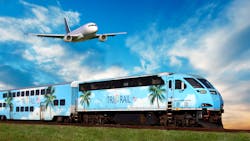SFRTA brighter future supported with a new rail fleet
The Federal Transit Administration’s (FTA) Rail Vehicle Replacement Program, a grant program established under the Infrastructure Investment and Jobs Act, has shed a light on the rail industry’s need for an update in vehicles, technology and, in some cases, air conditioning. The South Florida Regional Transportation Authority (SFRTA), the operator of Tri-Rail, was one of those cases.
SFRTA secured $ 71.7 million in the inaugural round of funding awarded through the Rail Vehicle Replacement Program; one of six transit providers to be awarded a combined $703 million. The grant will be used for the replacement of 24 locomotives and passenger cars that have exceeded or are near the end of their useful life. The agency is planning for six locomotives, 12 passenger coaches and six cab cars.
“It’s been a minute,” said David Dech, SFRTA’s executive director, when asked when the agency had last replaced and updated its vehicles and equipment. “We brought the last Brookville locomotives 10 years ago. We have a total right now of 21 locomotives, 29 coaches and 19 cab cars. Our locomotives age anywhere from 43 years old at the oldest to 10 years at the newest. Our cabs and coaches are 36 years old at the oldest and 11 years old at the newest.”
SFRTA is not alone in its challenges with an aging rail fleet. The Bureau of Transportation Statistics shows the average age of a commuter rail passenger coach was 25.3 years in 2021, showing a 25 percent increase compared to 2016. The average age of heavy-rail passenger cars was 23.9 years, at a five percent increase compared to 2016 and the average age of light-rail vehicles was 19.5 years, which is an eight percent increase compared to 2016.
When the initial group of funds for the Rail Vehicle Replacement Program opened, FTA explained older railcars contribute to service delays and increased costs while lacking newer amenities, such as digital signage and audio tools, that improve the riding experience and accessibility for persons with disabilities. The grant program allows agencies, such as SFRTA, to begin the process of fleet renewal.
SFRTA wants to invest its grant money in fixing some of its vehicles’ reliability issues. The agency explains maintenance on some aging vehicles is no longer enough to keep them running at the pace required by riders. SFRTA’s Tri-Rail service connects passengers with Miami International Airport, Fort Lauderdale/Hollywood International Airport and Palm Beach International Airport. Destinations where reliability of service is a priority.
Tri-Rail service connecting Palm Beach, Broward and Miami-Dade counties has been affected by the aging rail equipment. The vehicles now require more frequent maintenance and repairs, which means more time in the shop and less time serving passengers.
While the issue hasn’t had major effects on the agency’s timetable or scheduling, it has hindered the agency’s ability to swap out engines when they are out for maintenance.
New fleet brings technological advances
Almost all SFRTA’s equipment lacks modern amenities like Wi-Fi and charging outlets. Dech said SFRTA’s team has felt like they are “constantly trying to play catch up” to all of the other transit agencies in the area.
Victor Garcia, SFRTA’s director of public affairs, explains the new rail fleet will provide an opportunity to meet customer expectations.
“We want to have all the things that customers expect to have these days. Our passengers will have a much-improved experience when we procure new equipment with state-of-the-art technology,” said Garcia.
One critical component for rail cars in Florida is air conditioning, especially during the humid and arid months. SFRTA averages around 13,000 riders on weekdays and 6,000 on weekends. The agency served an average of nearly 3.4 million passengers in 2022.
Supply chain issues
Rail cars and locomotives have not been immune to the well-documented supply chain challenges experienced by the transit industry.
Dech notes this as a major concern for the SFRTA.
“We all have a concern about supply chain issues. The good news is that people have money to spend and the bad news is people have money to spend, and there's a limited number of suppliers,” said Dech.
SFRTA is hoping to resolve this by considering all options. The agency will not only be looking for efficiency in procuring the vehicles, but also for the quality of these vehicles for its riders’ benefit.
“We're in the infant stages of this procurement, we make sure that, you know, we buy something that is the best suited for South Florida’s climate and environment,” explained Dech.
This will be the first and largest order Dech will handle in his position as executive director. He wants to cover all of the bases when commissioning and receiving the order for the agency.
“There are regulatory compliance standards we have to go through when commissioning a locomotive,” said Dech. “Once we get the locomotive on site, we'll want to make sure that we follow the federal processes to make sure we commissioned everything properly.”
A group effort
SFRTA was one of the first grant recipients through the Rail Vehicle Replacement Program. While a boon for its rail fleet renewal efforts, preparing a grant application for a new federal program was daunting. Despite the lack of precedent, the SFRTA team put in the hours to ensure a correct application was received by the program.
“It was a lot of hours at Christmas time,” Dech said when asked about the application process. “This was time when people could have just left and went on vacation and did whatever they wanted, but they stayed here and put in the work to get this grant. People on our staff spent a lot of time around the holidays, making sure to do the proper research and answer the questions as accurately as possible, making sure we wrangle the supporters,” Dech explained, referring to the 20 percent local match requirement of the federal grant process to ensure the federal share does not exceed 80 percent of the net project cost.
A lot of major supporters at the state and local level including elected officials, the agency’s board, CSX Transportation, Brightline and Amtrak, helped SFRTA’s grant application.
Dech points out U.S. Rep. Lois Frankel (D-FL-22) as a key player in the success of the grant application with her letter of support to the FTA .
“This wouldn't have happened if we didn't have a lot of people partnering with us in support of this project,” Dech stressed.
About the Author
Eman Abu-Khaled
Associate Editor
Eman Abu-Khaled is a former associate editor with Mass Transit magazine.

